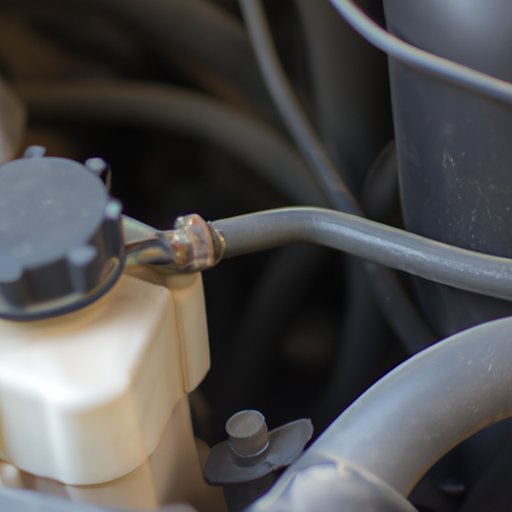
Introduction
It’s an easy mistake to make, but unfortunately, it’s one that can be quite costly: putting gasoline in a diesel engine. If you’ve made this mistake, don’t worry – you’re not the first person to do so. This article is aimed at helping you understand the effects of gas in a diesel tank and what you can do about it.
The Effects of Putting Gasoline in a Diesel Engine: What You Need to Know
Gasoline is harmful to diesel engines for several reasons. Firstly, gasoline has a lower viscosity than diesel, which means it doesn’t lubricate the engine components as well as diesel does. Secondly, gasoline has a lower flashpoint than diesel, which means it is more likely to ignite before the piston reaches the top of its compression stroke. Thirdly, gasoline has a different chemical composition to diesel, which means it doesn’t burn as efficiently in a diesel engine.
The effects of gas in a diesel tank can be quite severe. Gasoline can damage the fuel system components, including the fuel lines, fuel injectors, fuel filter and fuel pump, and it can also cause corrosion in the engine. If the problem isn’t addressed immediately, it can lead to costly repairs and even engine failure.
It’s important to address the problem of gas in a diesel tank as soon as possible to minimize the damage done to your vehicle.
Don’t Make This Mistake: Why Putting Gas in Your Diesel Engine Is a Big No-No
Putting gas in a diesel engine is a common mistake, particularly for those who are driving rental cars or vehicles they aren’t familiar with. This mistake can be costly and dangerous, as it can damage the engine and lead to unsafe driving conditions. It’s important to be aware of the appropriate fuel for your vehicle, particularly if you’re driving an unfamiliar car.
Not only can putting gas in a diesel engine be dangerous, it can also be expensive. The cost of repairing the damage caused by gasoline in a diesel tank can run into the thousands of dollars, and it’s not uncommon for insurance companies to reject claims for engine damage caused by misfuelling.
Prevention is key when it comes to avoiding the mistake of putting gas in a diesel engine, and being aware of the appropriate fuel for your vehicle is the first step in avoiding this costly error.
Exploring the Damage Caused by Gasoline in Diesel Tanks
Gasoline in diesel tanks can cause both physical and chemical damage to the engine. Physically, gasoline has a lower viscosity than diesel, which means it doesn’t lubricate the engine components as well as diesel does. This can cause damage to the fuel system components, including the fuel lines, fuel injectors, fuel filter and fuel pump. The chemical composition of gasoline can also cause corrosion in the engine, which can be expensive to repair.
Driving a vehicle with contaminated fuel can be risky, particularly if the damage to the engine is severe. It’s important not to damage other parts of the engine when addressing the problem of gasoline in a diesel tank, and seeking professional help if necessary is highly recommended.

When Accidents Happen: What to Do When You Put Gasoline in Your Diesel Engine
If you’ve accidentally put gasoline in your diesel engine, don’t panic. There are steps you can take to address the problem. Firstly, don’t start the engine or turn the key to the “on” position. This will prevent the gasoline from being circulated throughout the fuel system. Next, contact a professional for advice on how to proceed. They may recommend siphoning the fuel from the tank or draining the tank altogether.
It’s important to seek professional help if you’re unsure about what to do, as attempting to fix the problem yourself can lead to further damage and expensive repairs.
From Bad to Worse: The Risks and Repercussions of Putting Gasoline in a Diesel Tank
If gasoline is left in a diesel tank for an extended period of time, it can cause serious damage to the engine. From clogged fuel filters to damaged fuel injectors, gasoline in a diesel tank can lead to a range of problems. In some cases, it can even result in engine failure.
Addressing the problem of gasoline in a diesel tank immediately is crucial to minimizing damage and avoiding costly repairs. Don’t wait to seek help if you’ve made this mistake.
The Science Behind Gasoline in a Diesel Engine: Understanding the Chemical Reaction
The science behind gasoline in a diesel engine is relatively simple. Gasoline has a different chemical composition to diesel, which means it doesn’t burn as efficiently in a diesel engine. This can cause incomplete combustion and lead to a range of problems, including damage to the fuel system components and corrosion in the engine.
Preventing the problem altogether is the best way to avoid the risks associated with gasoline in a diesel engine. By being aware of the appropriate fuel for your vehicle and taking preventative measures, you can avoid this costly mistake.
Prevention is Key: How to Avoid the Costly Mistake of Misfuelling Your Diesel Vehicle
To avoid the mistake of misfuelling your diesel vehicle, it’s important to be aware of the appropriate fuel for your vehicle. If you’re driving an unfamiliar car, take the time to familiarize yourself with the type of fuel it requires. Try to avoid refuelling when you’re tired or in a rush, as this is when mistakes are most likely to happen.
Apps and other technologies are available to help prevent misfuelling. These can alert you if you’re about to use the wrong type of fuel, and can provide peace of mind for those who are prone to making mistakes.
Conclusion
Putting gas in a diesel engine is a common mistake, but it’s one that can be expensive and dangerous. The effects of gasoline in a diesel tank can be severe, but by being aware of the appropriate fuel for your vehicle and taking preventative measures, you can avoid this costly error. If you’ve accidentally put gasoline in your diesel engine, seek professional help immediately to minimize damage and avoid expensive repairs.




